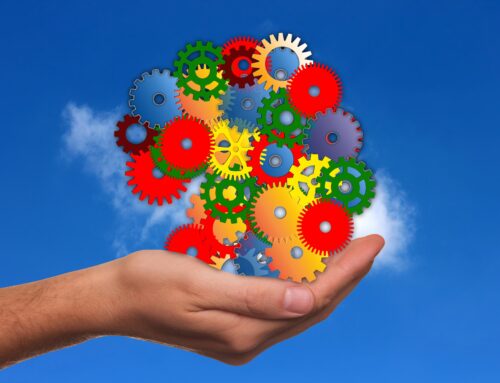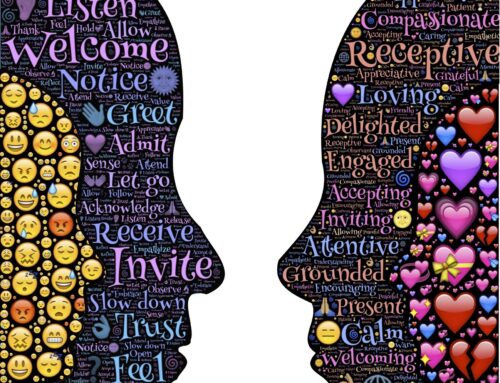
In my work as a Therapist, Coach and Trainer with an extensive range of organisational and individual profiles, I am seeing the centrality of the emotional intelligence to positive outcomes coming more and more recognised.
What Is Emotional Intelligence?
Emotional intelligence refers to the ability to identify and manage and regulate one’s own emotions. It also involves the ability to have an empathic connection with the emotional state of others and helping them regulate.
The key elements that constitute emotional intelligence are:
- Self-awareness.
- Self-regulation.
- Motivation.
- Empathy.
- Social skills.
The goal then is to harness our emotional intelligence and to apply it to cognitive tasks like thinking, assessing and problem-solving.
Over the past number of years the concept of emotional intelligence—sometimes referred to as emotional quotient or EQ—has gained wide acceptance. Most notably perhaps in the corporate world, where emotional tests have been included in the screening process in the interest of team building and better collaborative effort and better outcomes.
What Does It Mean to Be Emotionally Intelligent?
Someone demonstrating a high degree of emotional intelligence will have learned how to tune into their emotional states and be conscious of the vast range of their emotional experiences: from anger, sadness, anxiety, happiness, joy, excitement, and be able to include these and integrate any painful emotional experiences. Also, they will be able to reach out to others and communicate their needs around this. They will in turn show a significant level of sensitivity to the emotional states of others and be able to be measured and appropriate or boundaries in their outreach. They will make for good friends, partners, leaders, team players
It is important to say from the outset that all these skills can be learned and the emotional brain is very malleable and adaptive given time and support.
How is it different from Intelligence quotient?
Traditionally, a lot of emphasis on the IQ or the cognitive mind and much less on feeling and emotions as this was where the emphasis and focus lay in education and workplace.
Typically, the education system has been weighted towards the Intelligence Quotient which measures logic, the ability to reason, problem-solve, assess, and build strategy.
Whereas emotional intelligence, which is the ability to be self-aware, empathise, social skills, communication has been seen as a secondary function or complementary to the IQ.
However, neuroscientific research shows how our emotional, mental and physical experiences weave together through us and the results of this is the wonderful complex tapestry of who we are as a person and how we function in the world. Stephen Porges’ polyvagal theory working with the social engagement system in the centre of the body shows how the different parts of the brain the cognitive centre, the emotional centre, and the body are interconnected and regulated through the nervous system. When there is a deficit in one of these areas, the others are impacted in a negative way it. When there is harmony between them homeostasis is restored.
Essentially the traditional IQ / EQ dualism is not so clearly defined or certainly not mutually exclusive. I would use the metaphor of the Garden to represent the essential relationship between these two aspects of our mental experience. The cognitive mind or IQ being the seeds that are planted for growth, development, assessment, problem-solving, strategy, the hard skills that are key to achieving productivity and outcomes.
The emotional mind is the soil that nurtures these seeds in the person through self-awareness, communication, empathy, listening, observing, relationships, trust and collaboration, humility essentially that which sustains the productivity and outcome.
Global organisational Consultant Roger Evans in his book Leadership, uncovering the DNA of Leadership, is very specific about how this collaboration works between the cognitive mind and the emotional mind.
Borne out of over 30 years of experience and focused research which spanned 10 years, himself and colleagues examined what made for good leadership in the workplace.
Here I also include the concept of leadership in terms of the leadership responsibility we all have in our personal and professional roles whether we work at junior or senior levels, c suite or shop floor.
Evans and his team asked the question what makes for good leadership.? Why was it that very highly driven global corporates, Banks, Industry whose personnel were marked by a very high level of expertise and Intelligence Quotient for the task at hand, were not sustaining successful outcomes and burning out relatively quickly. This researcher asked – what are the ingredients in the successful Organisational leadership strategies that produced sustainable growth and desired outcome?
He writes:
In every situation, it was clear to us that where there was some degree of Self- Reflection and Self Awareness there was the potential for quality leadership. Where it was missing then the leader was in trouble and what we observed repeatedly over the years in these cases, was that they failed in the short and medium-term by creating around themselves an environment of dysfunction …Without developing Self Awareness and our ability to reflect upon ourselves and our thoughts, feelings and behaviours we are almost completely focused outside ourselves – we tend to objectify everything outside ourselves – and are thus controlled by the environment around us, by other people and their thoughts and feelings, by the events of business, of family and of society. In the extreme, without the ability to self-reflect we become in effect victims to the world around us. We react rather than proact and we are not aware that we are doing so! (1)
Their findings were weighted on the side of emotional Intelligence.
Evans concluded from his research findings that the following were the key indicators for successful and life-giving leadership.
There were 5 Dimensions to this successful leadership:
- 1DL – Ability to Self Reflect – Self-awareness,
- 2DL – Awareness of one’s impact on others, understanding their difference and their group dynamics
- 3DL – The ability to consistently see the whole picture and the dynamics between the ‘part and the whole’. The art of ‘thinking systemically’ and understanding system forces
- 4DL – Individual freedom (free will) to both make clear decisions and then to drive delivery in the face of resistance “to be blown in the wind, to bend but to stand firm”
- 5DL – The ability to ask for appropriate help and support – internally and externally to the organisation
- Self-Awareness – to know when and how do I relate to my environment. Am I being realistic? I am being impacted by my environment. What are my triggers, my perfectionistic tendencies, how do I relate to my work, have I a sense of fulfilment or not? have I meaning and purpose?
- My Awareness of others – to know how I impact others through my body language, communication, empathic connection, ability to walk some of the ways in their shoes.
- My awareness of the system I belong to – family friends work. How do these systems operate in terms of what is acceptable and what is not? What is the culture – a collaborative one, democratic, siloe, and how do I relate to that.
What are the limitations of these environments and what are its actual capacity for a different way of operating? And sometimes the organisation is stuck and needs a massive intervention and like the car needing an overhaul, this can be very disruptive and time-consuming and frustrating. There can be a similar pattern of how I relate to this across all the systems I belong to
- My awareness of my freewill and choice –Am I willing to take responsibility for this choice and tap into the actual power of my will which is more about tuning into my meaning and purpose and values and making choices from that place and in relation to others
- My Awareness of my limitations as a human being:
Finally, and the ingredient which was the highest variable in the findings for great leadership: The ability to ask for help.
Those who recognised that no one is an Island and they are not made to operate in isolation. Those who knew their strengths and their weaknesses and could identify others who they could work in collaboration with to optimise results.
Those who were able to own the fear of failure or recognise in themselves the avoidance of shame keeps them out of a relationship with their true potential
Why does EQ matter?
We have our skillset and can be highly functioning at the cognitive level however, at the same time, we can feel very disempowered and devalued. Yes, the organisation can be remiss around their responsibilities with regard to mentorship and training and unreasonable KPIs. However, we need also to dig a bit deeper and identify any gaps in our own self-esteem and to address any self-beliefs that inhibit our confidence and progress. For example, where we put ourselves under pressure to overachieve in compensation for feeling inadequate in other areas of our lives, our primary relationships, our fear of intimacy, fear of failure or being shamed. We need to be able to regulate and soothe that wound in us understanding its origins not to get stuck in the past or analysis paralysis but to understand the system we have downloaded and to update it to more a helpful one that can serve us now we are adult.
Furthermore, sometimes we want to purge our emotional life of its messiness, unwieldiness perhaps anger, frustration, disappointment, fear, anxiety through keeping ourselves busy like the hamster on the wheel, through working out in the gym or other exercise or diet routines. We want to keep things running logically if I do x,y and z, I will feel better or maybe not feel at all. but we need to recognise it for what it is. Our emotions are like the guard dogs on our house or the alarm system or our caring neighbours. Our emotional life nurtures, guards, prevents us from going outside of what is appropriate and what is a fit for us.
If and when we feel that we have no other options but to ignore those signals, then we need to reach out for support for the journey. This can take the form of friends, family or indeed coaching, therapy, training. Whatever support track we choose it is important to remember no one is an island and that we are social we need each other. Especially at this time of Covid 19 we can come under a lot of pressure to ‘get things right’: to sanitize adequately, to social distance and at the same time we are encouraged to support one another because we are social animals and only together will we feel regulated.
A lot of people are reporting feeling very anxious and being anxious about being anxious. Essentially because for some, it is their first time being aware that they feel anxious. The reality with anxiety is that it has two wings. One of which is in the positive excitement and motivation to do well and reach the desired goal category, and all the adrenaline pump that goes with that. Then the other wing goes towards an anxiety that tips into a toxic emotional state where we feel overwhelmed by self-expectation to do well and to succeed. This has more to do with an avoidance of feelings of failure and the potential onslaught of feelings of shame.
So, slowing things down and becoming more and more emotionally intelligent is crucial to wellbeing and performance. The current phenomenon of global lockdown and working remotely has proven to be very challenging in terms of emotional intelligence. Some workers before the restrictions on their travel have reported that they never really had to deal with their emotions. This they report was because they could keep themselves busy on the treadmill of work, commute and home, but now with working from home they have more gaps in their day where they are finding to sit with themselves and feel the feelings. Some have struggled to negotiate the experience an absence of personal contact and peer empathic connection which and the feelings of isolation and abandonment that this ‘new normal’ evokes.
The good news is that many people are finding that in reaching out for support and dealing with their anxiety and other emotional states they are learning a lot about their own inner belief systems and how they have been keeping themselves back from a more satisfying life through hiding from their fears. There are many, many cases of people waking up to paralysing belief systems and ways of behaving that during this time of adaptation they have had to confront and transform.
Operation Transformation
For many they are consciously and proactively acquiring the tools for building emotional intelligence and learning to speak the language of their emotional lives. They are seeing that this goes hand in hand with their cognitive performance, problem solving, strategies and team building, goal setting and sustainable outcome in both their personal and professional lives.
We need to slow things down, less of the hamster and more of the tortoise, to become aware of the body, mind and feelings through mindfulness practices, Tai Chi, Yoga, Meditation, Sports, the gym, music and the arts.
I will leave you with a suggestion for growing your overall wellbeing and a key to building emotional intelligence: To put aside 5 – 10 mins a day (or more if you are willing) to connect in with yourself and to practice self-empathy for you. One exercise is to make a cup of tea / your favourite beverage at least once a day with an act of love and kindness and empathic regard and deep appreciation of yourself and all the ups and downs life has brought you on your journey. Can you hear yourself recoil or resist at the thoughts of this suggestion?! Perhaps another way of looking at it is to consider – how can I have empathy for another person if I cannot walk in my own shoes and feel the impact of the path on your feet?!
Roger Evans, 5DL Leadership, uncovering the DNA of Leadership. CLC Publishing, 2019
Stephen Porges, The Polyvagal Theory: Neurophysiological Foundatons of Emotions, Attachment, Communication, and Self-Regulation. Norton & Co, New York /London, 2011



